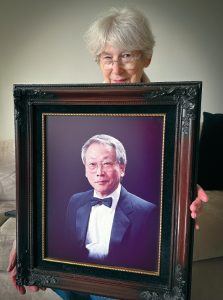April 29, 1992, marks a painful but pivotal chapter in the history of the Korean American community in Los Angeles. Thirty-three years ago today, widespread riots broke out across the city, leaving many Korean American businesses looted and burned. Despite desperate calls for help, police presence remained largely absent, forcing Korean Americans to defend themselves alone. Yet in the midst of chaos and despair, the community found unity and strength.

“Where were the police?”: Carol Min Recalls the Day

Carol Min, widow of the late Min Byung-Soo, a Korean American attorney, vividly remembers the moment she first saw the riots unfold. Living in Park La Brea, just three miles from Koreatown, she saw the flames and smoke rise from her rooftop.
“The flames were high, and smoke covered the sky,” she recalled. “I had never seen anything like that before.”
As fear of further violence grew, Min Byung-Soo took immediate action. He assembled a legal support group under the Korean American Bar Association of Southern California (KABA), consisting of 11 lawyers. Together, they provided legal aid to Korean business owners affected by theft, arson, and property destruction.
Carol Min said the community’s cries for police assistance went unanswered.
“Many Korean American shop owners waited for the police, but they never came,” she said. “To this day, I still wonder where they were.”
Legal Aid and Community Recovery
Carol Min recalled that her husband spent more days out in the community than at home during that time, working alongside fellow attorneys to assess damage and strategize recovery efforts.
“He was rarely home. He was always out, discussing recovery plans and inspecting the damage in person,” she said.
She also remembered how the demands of that time deeply affected their family.
“Because he was always busy, he barely had time for our two sons,” she said. “One of them once said, ‘I wish dad would spend more time with me, but he’s off to work again.’”
Media Misrepresentation and Unfair Targeting
Despite being victims, Korean Americans were often portrayed in the mainstream media as if they were part of the problem. Carol Min expressed frustration at this misrepresentation.
“We were neither the cause nor the culprits of the riots,” she said. “It broke my heart to watch Koreatown burn because this community has been such a huge part of my life.”
She also reflected on the racial dynamics during the unrest.
“It felt irrational that some in the Black community expressed their anger through violence against Korean Americans who had nothing to do with the cause of the riots,” she said.
Lasting Impact: Growth and Political Empowerment
Despite the devastation, Carol Min believes the 1992 LA riots ultimately strengthened the Korean American community.
“Although the riots weakened the center of Koreatown as some people left, our political and economic power grew tremendously,” she said.
She pointed to the increase in Korean American judges, politicians, and public officials as signs of the community’s progress.
She also praised younger generations for fostering a spirit of solidarity.
“There used to be a lot of division and competition, but now young Korean Americans are more cooperative and united,” she said.
The Need to Remember
While more than 30 years have passed, Carol Min expressed concern that memories of the LA riots are fading.
“The LA riots were a turning point in Korean American history,” she said. “If we want to keep moving forward, we must never forget what happened.”
BY KYEONGJUN KIM [kim.kyeongjun1@koreadaily.com]




